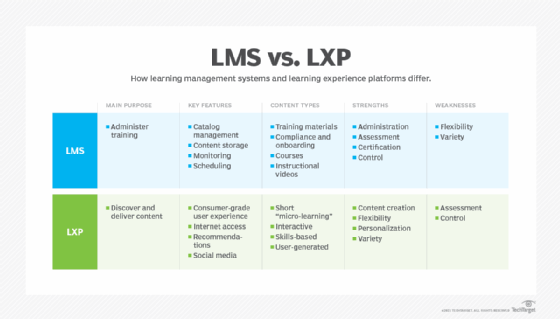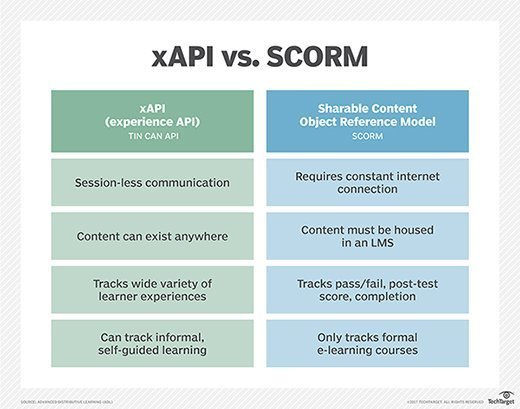xAPI (experience API)
What is xAPI (experience API)?
Experience API, also known as xAPI or Tin Can API, is a software specification that allows learning technology products, such as systems, websites and applications, to collect and exchange data about a learner's experiences when they interact with these products. It provides a simple vocabulary that allows different learning systems to communicate with each other and rules for communicating learning events to a permanent storage system called a learning record store (LRS).
What does experience API do?
The xAPI is an interoperability specification for learning technology. It describes the rules and parameters governing the core functionality of an LRS and determines how various learning technology products will communicate with each other to share data about learning events and learners' experiences. The goal is to help improve learners' experiences as they interact with those products while learning.
The LRS, a learning application defined by the xAPI specification, stores records about learning. It might be part of an enterprise learning management system (LMS) or it might be an independent application. Either way, it collects and integrates data about learners' interactions with various learning systems and applications and works behind the scenes to influence learning experiences. The LRS is comprised of four detailed application program interfaces (APIs) that can be accessed over the internet.
In an xAPI-governed LRS, a learner or administrator can view the statements of a particular learner and identify the actions taken across a variety of activities. Also, some learning systems that support xAPI use these statements as prerequisites for awarding accomplishments and badges.

How does the experience API work?
XAPI describes the activity providers (LMS, courses, games, videos, simulators, etc.) that generate xAPI statements and the LRS endpoints that receive these statements and store them in a database. The standard is used to record all the interactions between people and learning systems. It identifies a learner by email address or other unique identifier and sends a record or statement of a learning activity to the LRS in the "noun, verb, object" format. This simple and standardized format makes it easy to record any learning activity from any activity provider. The statement includes the learner's identity along with additional data, such as the learner's action and specific learning or content activity.
All statements generated through xAPI are stored in the LRS. xAPI allows different LRSes to talk to each other and share statements. An LRS can also share statements with external applications.
XAPI also provides device freedom, meaning any device can send xAPI statements to an LRS. And the tracking of learning events can start from any application or device being used by the learner, even if that application or device is not part of the LMS.
Experience API history and evolution
XAPI was developed in 2013 to capture learners' experiences and store information about those experiences in an LRS. The specification was developed by Advanced Distributed Learning (ADL), a program of the U.S. Department of Defense (DoD). The DoD also created the Sharable Content Object Reference Model (SCORM), a popular interoperability technical standard for e-learning software products. SCORM governs how various e-learning LMSes, and content communicate with each other. Any SCORM-conformant LMS can play e-learning content, if the content is also SCORM-conformant.
Despite its ubiquity, SCORM and other standards had proved to be inadequate for mobile e-learning by 2010. One drawback was that these standards require a constant Wi-Fi connection, which is not always possible with mobile devices. Another drawback was that the details required by course developers were not provided by SCORM. Furthermore, SCORM doesn't function very well in situations involving collaborative learning, simulations, internet of Things (IoT), and augmented reality/virtual reality e-learning. xAPI emerged out of a need to address these shortcomings.
The project to develop the initial xAPI specification was awarded by ADL to Rustici Software, based in Franklin, Tenn. It was originally named Project Tin Can because it was meant to encourage two-way dialogs between Rustici Software and the global e-learning industry and community. Rustici Software worked on the project for 16 months before completing the initial .90 version of the specification. After that, it was further developed by an open community group directed by ADL. Version 1.0.0 of xAPI was released in 2013 and the specification continues to evolve through community efforts led by ADL, which remains its steward.

Advantages of experience API
Experience API enables more advanced uses than SCORM because it can interact with mobile applications and track a learner's real-life outcomes in addition to their training activities. SCORM, on the other hand, is primarily concerned with tracking training delivered directly from an LMS.
Applications have been developed that use xAPI to record learning events across a wide variety of uses. These include instructor certification, reading an e-book, interacting with web videos, virtual reality simulations, assessments and meetings.
XAPI is currently being used by many organizations, including some of the largest U.S. companies, flight schools, medical training facilities and various military organizations.
See what makes a good learning management system. Learn about the six types of learning management systems and explore the six benefits of a learning management system.






